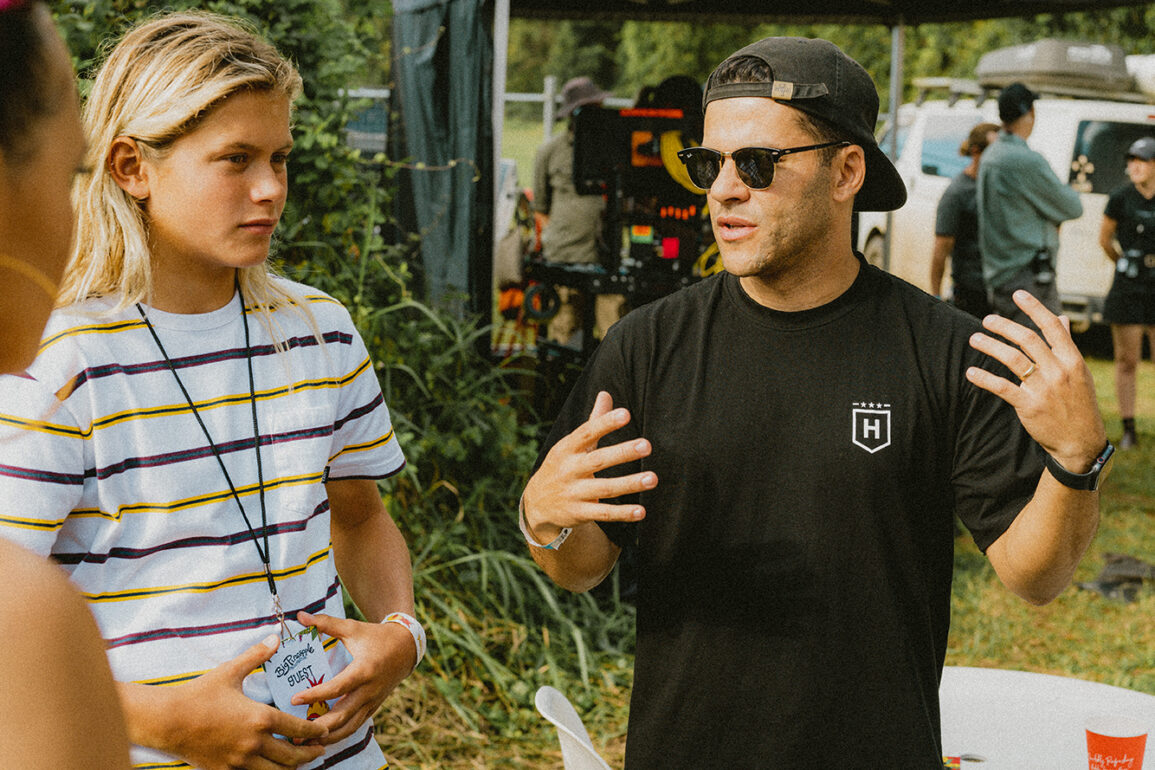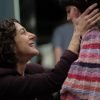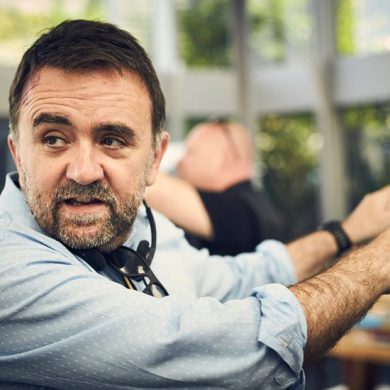Macario De Souza is a musician and filmmaker, and with his new film 6 Festivals, he manages to blend the two worlds together to create an ode to youth culture, Aussie music, the c-bomb, and friendships that last a lifetime. Over the course of six music festivals, three close friends James (Rory Potter), Maxie (Rasmus King), and Summer (Yasmin Honeychurch) go through the ups and downs of life, including fractured relationships with family members, encounters with drugs, not having any money, all ultimately culminating in a journey tinged with the difficulties mortality. With the soundtrack of the year that features live music from Ruby Fields, Dune Rats, Lime Cordiale, and G Flip, 6 Festivals is bookended with versions of an Australian anthem that we all know and love, and if you’re like me, you’ll be left in tears at the end.
In this interview with Macario, we talk about the importance of bringing that Aussie vibe to this story, and how the balance of getting the highs and lows of life was vital to the narrative of James, Maxie, and Summer.
6 Festivals is currently screening at the Melbourne International Film Festival, and will have a theatrical run in Australia before landing on Paramount+ in August 2022.
I thought it was brilliant. It’s got the best soundtrack I’ve heard this year. You must be absolutely stoked that it’s now heading out into the world.
Macario De Souza: That’s right. It’s out in cinemas on Thursday, and then Paramount+ August 25. Yeah, [I’m] just more relieved than anything. It was such a bloody mountain to climb. And yeah, just glad we got there.
How do you even go about navigating filming not just one music festival but multiple music festivals and chuck a pandemic into the mix as well.
MDS: Yeah, the crazy thing is, the pandemic was probably a small part of it. When we started making this film [and getting it] ready for production, festivals were struggling and there’s a lot of issues with the government and the issues with drugs and police presence and so on. A lot of the big festivals or medium to small ones were closing down and just having a couple of years off, and so the ones we partnered with disappeared. And the first one we went to shoot was canceled because of the bushfires. And then soon after we partnered up with another one, and that was flooded, and then the pandemic hits. So we had a couple of lock downs. And then we had one more flood when we tried to finish the film of the Northern Rivers here. So we got everything thrown at us.
And it was hard enough just to shoot at real festivals, let alone all these hurdles that got thrown at us. And once we were at the festival, it was exciting. It was challenging physically, but every time we looked at the viewfinder, you could just see we’re capturing gold. And I guess that’s the vision that I had, it was a non-negotiable where we had to shoot it at real festivals and captured that rawness and that realness. And I think music films in the past have somewhat fallen short because of that lack of authenticity, I think. And that’s where I wanted to make sure that we captured that culture so energetically and just putting the viewer in that hot seat of feeling like they were there and going for that ride.
There was a lot of challenges with a lot of sound bleed from all the stages, so we tried to go in and think about it in a way where we capture a lot of the wides and mediums and just get that colour, get the performances. We got a lot of heavy dialogue stuff on our own set builds later. And the occasional kind of drunk punter and whatnot trying to get on camera. Which is surprisingly not as bad as I thought it was going to be, they would tend to actually look at the actors instead of the camera to see who was being filmed. And then anytime they try to jump in the camera, we just said, “Look, if you just stand there and dance you’ll be in the film.” And they did that and it managed to work.
So yeah, five years later, here we are. I think just watching it on the big screen, that’s the ultimate payoff. Everyone works so hard to make this film happen, and it’s just so rewarding to see on the big screen now.
What I love about it is the Australian voice just carries through, not just in the music, but in the dialogue. I absolutely love the excessive use of the c-word here, because it is a joining word. It’s how we talk to one another. I’m curious for you how important was to have that folded into the film alongside the Aussie acts as well.
MDS: Yeah, it was a bit of a battle because I felt youth stories in Australia missed the mark a little bit where they had a lot of older actors playing younger people, or it was older filmmakers reminiscing back in the old day and just that disconnection between the reality of how young people walk and talk and interact. Dialogue was important to me and young people barely talk, they just make noises and grunt and whatnot. And so I try to strip dialogue back as much as possible. If you have a listen to how young people talk, particularly where I’m from in Maroubra [NSW], and that kind of street urban culture, it’s constant swearing, and it can be an affectionate way of talking to someone and it could mean other things as well. So just wanted to play that in there.
The young actors themselves were really connecting with the script from that first stage because of the way that the dialogue was used. I thought it was really authentic. And I also allowed them the space to change things, shorten things, add their own flair. A lot of people asked me to get rid of the swearing and I just had to fight for it because I just felt like it was an important part of representing the Australian culture.
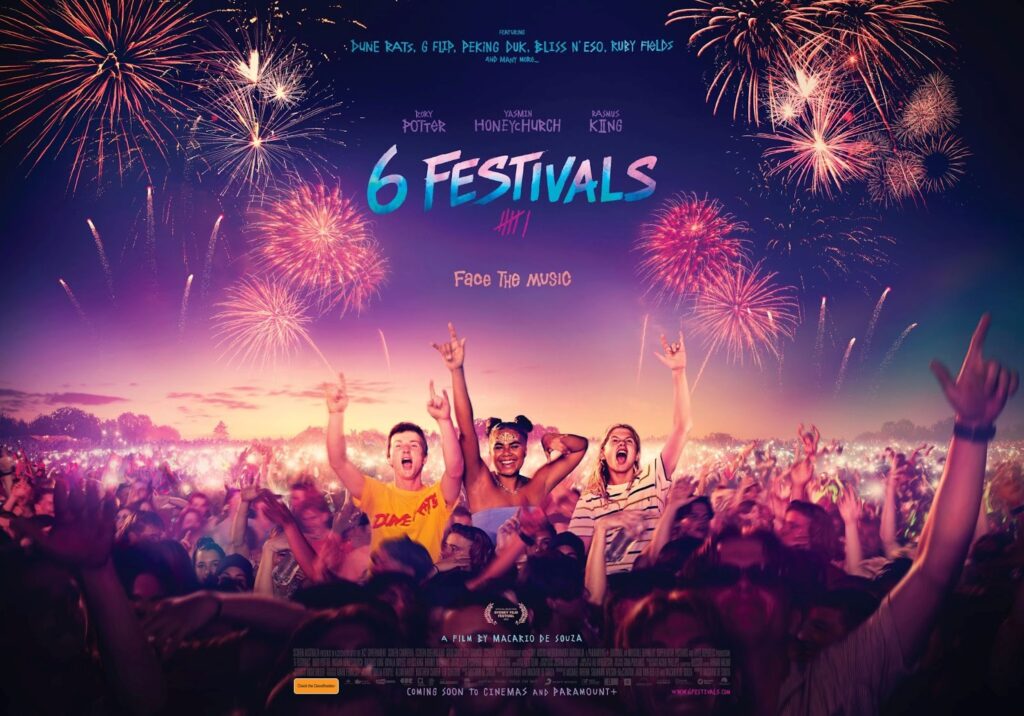

When I heard it in the first five minutes, I was just like, “Yes, I know that it’s gonna be good. I know it’s gonna work.” As you say, we don’t get to see that on screen very much. It feels diluted or censored, and that’s how kids talk.
MDS: I’m glad you picked that up. When you do these interviews and you hear questions and things like that, where clearly you got it and it resonated with you. And I just love that, it makes me excited, because it was the things that I fought for. And I think filmmakers probably fall in that trap of just having to push through and listen to whoever’s backing the film, or who the audience is. I just wanted to make sure this thing was gritty and raw and when people resonate with it, you’re like “That’s why I fought for it.”
One of the things which I love is the moment where Phil Jamieson [from Grinspoon] talks about the importance of getting to see a tune live for the first time and getting to experience it live with a whole bunch of people. How important was it to replicate that energy on screen for you?
MDS: I’ve been so embedded in the music game for so long, personally, as a fan, then, as an artist, and then my production company, we do a lot of work with record labels and artists, and so I guess, at some point, I was almost too close to it. And I really tried to curate music that even years later made me feel a certain way and just had a great emotion to it. And I tried to also give a cross section of genres and diverse cultures within the artists. And I think some of it, to answer your question, came from the reactions of the young kids who weren’t as connected with some of the music that was there. They were with a plethora of them, but not so much across the board.
Seeing what their reactions [were] and playing them back to them, some of our rehearsals was all based on pumping this playlist really loud and getting them dancing around like friends, and just singing and learning the songs. There’s a couple of songs that I even changed based on their reactions that may not have been as great and some that the lyrics just resonated with them and I was like “Great, we can play with this a little more.” It’s a bit of that trial and error. And just finding songs that for music fans or non-music fans, it has something that cuts through, whether it’s a certain lyric or that beat just makes you feel something, otherwise it just feels a bit like filler. And I just didn’t want any filler tracks. Every song really either drives the narrative or makes you feel a certain way.
Let’s talk about the cast. You got Rory [Potter], Rasmus [King] and Yasmin [Honeychurch], who are just wonderful together. How did you go about casting them and making sure that they had that friendly bond together?
MDS: It was a big part of it, trying to make sure that there was a real friendship there.
Rasmus was the first one I cast a long time ago, he was 13. I came across him through some friends that connected me with him through the surfing scene. He has this incredible presence on his Instagram page with his brother Kyuss, who is a professional surfer who actually plays his brother Kane in his film. They’d put their phone on the dashboard and drive around and do these car jams and just rock along to some metal songs. Rasmus and Kyuss were named after their dad’s favorite metal bands, so they’re right into the music. He was so charismatic and I met with them and had this idea for them to play real brothers and I had the idea of surf scenes and one of them to really surf in it. So it just all felt really real.
Once I had Ras, I started to look who was going to work around him, and the rest came from our casting agent, Lee Pickford, who was great in finding me amazing talent. We looked through so many James’s and Rory was the very last tape to come through at the 11th hour. He was doing a tour on a theater show in Europe, and so he came in late. Ever since he opened his mouth, I could hear this tone in his voice and in his face and everything about him was so likable. And James needed to be that. And he comes with a lot of experience. He was great. And Yasmin Honeychurch. She had this real quirky ending to her audition tape that made me really connect her with Summer who, at first, you feel there’s this confidence, but really there’s this sense of insecurity and trying to work herself out and just quirkiness that that Yas had.
We then spent a lot of time rehearsing. I booked an old shack in Byron Bay that we spent a couple of weeks together. It wasn’t really about the script, it was more about just these kids spending time together. We’d go fishing, we went surfing, play soccer, and barbecue, and I just wanted them to have a good time and get to know each other. They were young at that stage. And I look back to how I created great bonds with new people, and to me it always was a big night out or something like that, and I wanted to replicate that kind of scenario, but just a bit more toned down. We would spend day and night together.
And I guess with all the hurdles we had, and the stop and starts with lock downs, they just meant that these guys had gotten more time to spend together. By the time we got on set, they just had their own little in jokes, they had their own handshake, they had their own language, and it just really popped on screen because it was real. I think selling the film is really about everything that’s authentic within both the friendship and the music.
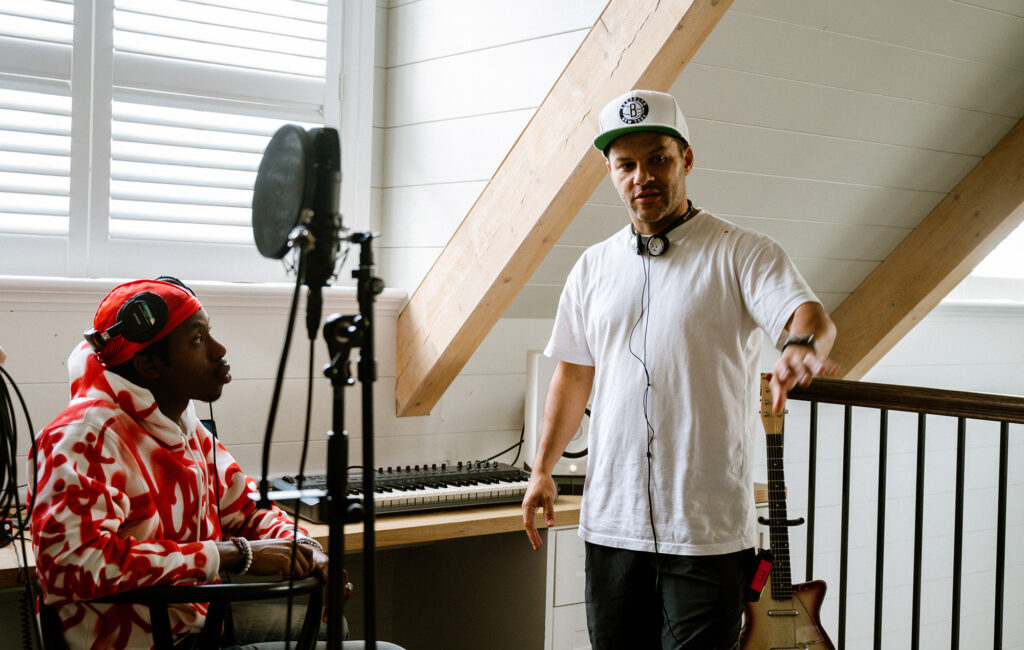

One of the things which I really love is that relationship between having the best time of your life and having the worst time of your life at the very same moment. That feels to me like one of the main themes of the film. How important was it to explore that tone of dealing with what James is going through, and having that support there in such a vibrant, exciting environment?
MDS: If you think about when you’re a teenager, everything seems so much more heightened because our hormones are flying, and we’re trying to work out how to keep our emotions at bay all night. We had the best times and the worst times of our lives all in the same week, particularly the same weekend. And you put that idea of friendship and good times and bad times and dealing with loved ones or losing a loved one in the backdrop of the euphoria of music festival, I just thought it would make for more heightened drama and visually something that was stimulating. We kind of had the idea that this would just be told through the prisms of the festivals. It was like chapters per festival, and we laid on the idea of the stages of grief per festival; denial, anger, etc.
We also had two sets of rules, freedom and containment, with our cameras. So anytime the kids were at festivals, we had it handheld because they were away from parents or teachers, away from authorities. It was handheld, like a 50mm lens, like the human eye, we were in there with them. And anytime there were police or in a car or with parents at home, it was more considered, locked off type shots that really gave us that dynamic visually that represents the life of teenagers.
I just felt like it was unique to set it in that world. I don’t think had been done before, not to this extent. And it just gave it a little more excitement. When things were good, it was visually stimulating. And when things were bad, you really felt it particularly because we were able to feed that music through it and push it to that limit. I think it just sort of made for an interesting mix.
As I mentioned at the beginning, it’s got one of the best soundtracks I’ve heard this year. Is that cover at the end going to be available to listen to down the line?
MDS: Yeah, it’s a big question. It’s still getting tossed around. It’s such a big classic song that it needs to be treated with respect. There was a lot of back and forth to try and get everyone to do it because it’s almost like too big of a classic that I didn’t want to ruin it. There’s a lot of mutual respect between Dune Rats, Ruby Fields, and Powderfinger. And they’re all obviously friends, but yeah, we’re definitely we’re talking about it. It’s something that keeps coming up in every interview and every screening. So I think it needs to be considered. Yeah, we’ll see.

